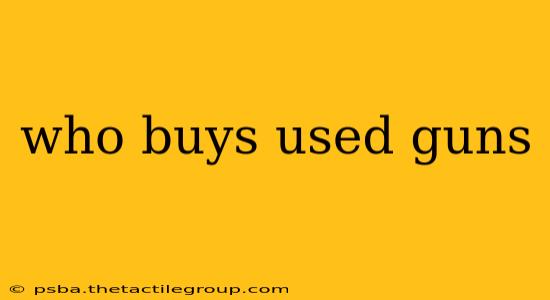Selling a used gun can seem daunting, but understanding the market and your options is key. This guide explores who buys used guns, the legal considerations, and how to navigate the process safely and effectively.
The Major Players in the Used Gun Market
Several avenues exist for selling your used firearm, each with its own set of advantages and disadvantages. Knowing who buys used guns and their respective processes will help you make an informed decision.
1. Licensed Gun Dealers (Federal Firearms Licensees or FFLs)
FFLs are the most regulated option. They are licensed by the Bureau of Alcohol, Tobacco, Firearms and Explosives (ATF) to conduct firearm transactions. They typically offer:
- Convenience: They handle all the paperwork and background checks, simplifying the process.
- Safety: Transactions are conducted under the watchful eye of the law, reducing the risk of illegal activity.
- Lower Price: Expect a lower offer compared to private sales, as they factor in their costs and profit margins.
However, the lower price is often offset by the peace of mind and legal compliance this route offers.
2. Private Gun Sales
Selling privately allows you to potentially get a higher price. However, this option demands significantly more caution and legal awareness. Buyers in private sales might include:
- Collectors: Enthusiasts seeking specific models or rare firearms.
- Shooters: Individuals looking for affordable firearms for sport or self-defense.
- Investors: Some see firearms as an investment opportunity, particularly with certain collectible models.
Critical Considerations for Private Sales: Always follow all federal, state, and local laws regarding firearm transfers. This usually includes conducting background checks through a licensed dealer, even in states that don't mandate it. Neglecting these steps can lead to serious legal consequences.
3. Online Gun Auction Sites and Forums
These platforms offer a broad reach, potentially exposing your firearm to a larger pool of potential buyers. However, be aware of:
- Scams: Exercise extreme caution when dealing with unknown individuals online. Verify identities and use secure payment methods.
- Shipping Regulations: Shipping firearms has strict legal requirements that must be followed meticulously. Improper handling can result in legal trouble.
- Fees: Many online platforms charge listing fees or commissions.
Thoroughly research any platform before listing your firearm. Read reviews and understand their terms of service to mitigate risks.
Legal Considerations: Navigating the Maze of Regulations
The legal aspects of selling used guns are complex and vary significantly by state and locality. Before selling any firearm, familiarize yourself with:
- Federal Laws: The Gun Control Act of 1968 and other federal regulations dictate the legality of firearm sales and transfers.
- State Laws: Each state has its own laws regarding firearms, including background checks, registration requirements, and permitted types of sales.
- Local Ordinances: Cities and counties may have additional restrictions on firearm ownership and sales.
Consult an attorney specializing in firearm law to ensure you comply with all applicable regulations. Ignoring these laws can lead to significant penalties, including fines and imprisonment.
Conclusion: A Safe and Legal Approach to Selling Used Guns
Selling a used gun requires careful planning and adherence to the law. Weigh the pros and cons of each selling method – licensed dealers, private sales, and online platforms – and choose the option best suited to your comfort level and legal requirements. Prioritizing safety and legal compliance is crucial throughout the entire process. Remember, responsible gun ownership extends beyond just owning the firearm; it encompasses its sale and transfer as well.

